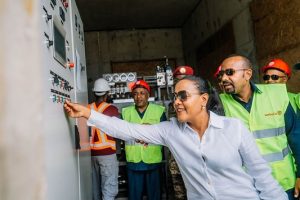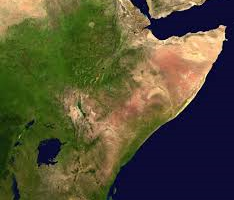
For over fifteen years, Somalia has been engaged in a relentless battle against the Islamist militant group Al-Shabaab, with the support of countries like Ethiopia and various world organizations. However, the terrorist group continues to pose a serious threat to the nation’s stability and the wider region.
The recent incident in central Mogadishu, where a suicide bomber struck a cafe as football fans were watching the Euro 2024 finals, underscores the on-going challenge. While the attack left at least five people dead and another 20 injured, no one has claimed responsibility yet. Nonetheless, such acts of cruelty by Al-Shabaab have become all too familiar in Somalia.
Despite the efforts of many countries and entities, Somalia’s former national security advisor and foreign minister, Abdisaid Muse Ali, has controversially suggested that Al-Shabaab is the only effective force capable of defending Somalia from any aggression. This neighbour’s statement, made during an interview with the BBC Somali Service, has raised concerns about potential divisions within the Somali government.
Some have even suggested that, the Villa Somalia government may be surrounded by officials who are acting as “double dealers,” using Ethiopia’s need for sea access to maintain their positions and facilitate terrorist activities. However, the reality is that Addis Ababa has long expressed a desire for a mutually beneficial, “win-win” approach to the issue of sea access.
Ethiopia has repeatedly revealed its interest in the matter, offering a cooperative mechanism to utilize neighbouring countries’ ports. Unfortunately, Somalia has denied these proposals, leading Ethiopia to explore alternative options, including an agreement with Somaliland.
However, Prime Minister Abiy Ahmed (PhD) claimed that, Ethiopia signed the Memorandum of Understanding with Somaliland “not because we have questions about Somalia’s unity, but because we had tabled the question to all our neighbours and received no response.”
This has further strained the relationship between the two countries, with Somalia accusing Ethiopia of meddling in its affairs.
Also, Prime Minister Abiy has stated that, the problems between Ethiopia and Somalia can be resolved through direct dialogue, “with one hour of flight and one hour of discussion,” negating the need for the Somali government to travel to other nations and level accusations against Ethiopia.
This indicates that, the two countries should prioritize bilateral diplomacy over seeking external mediators. Experts have emphasized the importance of strengthening diplomatic engagement, collaboration, and modern approaches to resolve the differences between the two nations.
In a recent exclusive interview with The Ethiopian Herald, Haramaya University Political Science lecturer Emiru Gemechu (PhD) stated that, it is high time for all diplomatic communities, scholars, Diaspora members, and other segments of the community to strengthen diplomatic engagements in resolving differences between the two sisterly countries.
Drawing on the experiences of various landlocked countries’ seaport accession and related issues, he emphasized the importance of stakeholder collaboration in navigating the root causes and bridging differences on both sides to promote cooperation and ensure long-term peace in the Horn of Africa.
“It is also highly critical to get rid of out-dated diplomatic ventures and steadfast the modern diplomatic approaches that go along with the 21st Century through strengthening cooperation and partnership in the region.”
He stated that, Ethiopia has been using win-win measures to ensure mutual interests.
Seconding the preceding rationale, Addis Ababa University Human Rights and Federalism Researcher Sisay Mengistie (PhD) emphasized that, both sides’ on-going diplomatic efforts should focus on avoiding escalation of the disagreement and using exhaustively peaceful avenues to restore diplomatic ties.
He emphasized the importance of convening meetings between Ethiopian and Somali experts, as well as diplomats from around the world, to maintain cordial relations.
“Apart from promoting the people-to-people ties and socioeconomic significance in between, Ethiopia’s quest for sea outlets will have a paramount contribution towards ensuring peace and security for the region,” he claimed.
Commending Ethiopia’s all-weather alliance with Somalia, particularly during difficult times, he urged the latter to return to the negotiating table.
He also advised both countries to ignore those who seek to inflame tensions. According to him, intellectuals, diplomats, and others must play their proper roles in resolving the diplomatic crisis between the two countries.
Despite these diplomatic tensions, Ethiopia’s support for Somalia in the fight against Al-Shabaab remains indispensable. On the military front, Ethiopian armed forces have conducted joint operations with the Somali National Army (SNA) and the African Union Transition Mission in Somalia (ATMIS), targeting Al-Shabaab strongholds. This coordination and the deployment of Ethiopian troops have significantly bolstered the capabilities of Somali and ATMIS forces in their counterterrorism efforts.
Moreover, Ethiopia has worked to build the capacity of Somali military and security personnel, offering training in areas such as counterterrorism tactics, weapons handling, and unit-level operations. This investment in developing Somalia’s security apparatus is seen as critical to the long-term efforts to weaken Al-Shabaab’s grip. Currently, Somali police officers are undergoing training at the Ethiopian Police College.
Beyond the military realm, Ethiopia has provided substantial economic assistance to Somalia, including delivering development aid, facilitating trade and investment, and granting Somalia access to vital transportation infrastructure. This economic support is crucial to undermining Al-Shabaab’s influence and fostering sustainable development in Somalia.
Ethiopia’s humanitarian aid has also been vital, particularly in areas impacted by Al-Shabaab’s violence and the region’s recurring droughts and famines. The delivery of food aid, medical supplies, and other relief materials to affected communities has helped to alleviate the suffering caused by these crises and strengthen the resilience of the Somali people. It is worth noting that many Somali refugees have found refuge in Ethiopia as well.
The decision to refer to Al-Shabaab as Somalia’s defence force is not only misguided but also dangerous, given the threat the militant group poses to both the country and the region. It is crucial to prioritize discussions on sea access with Ethiopia over inadvertently empowering this group and causing regional instability. The recent talks between the foreign ministers of Ethiopia and Somalia in Ankara, Turkey, mark a commendable step in addressing the two countries’ strained relations following the MoU.
The Ministers met in Ankara and had an open, friendly, and forward-looking discussion about their differences, exploring approaches towards addressing them within a mutually acceptable framework, according to a statement released by the Ministry of Foreign Affairs (MoFA) after the discussion.
Ethiopia and Somalia both reaffirmed their commitment to resolving disputes peacefully and conveyed gratitude to Turkey for its helpful assistance and facilitation.
According to the announcement, the two ministers decided to get together once more for another round of talks on September 2, 2024, in Ankara.
BY EYUEL KIFLU
THE ETHIOPIAN HERALD TUESDAY 23 JULY 2024





